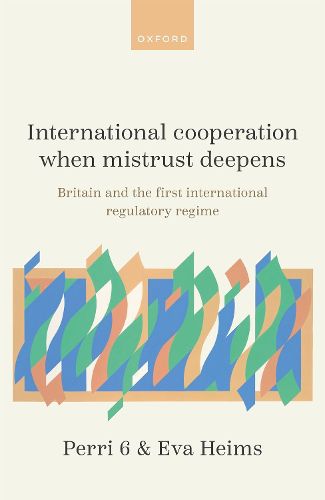Readings Newsletter
Become a Readings Member to make your shopping experience even easier.
Sign in or sign up for free!
You’re not far away from qualifying for FREE standard shipping within Australia
You’ve qualified for FREE standard shipping within Australia
The cart is loading…






In the years leading up to the outbreak of war in 1914, Britain was collaborating closely with Germany on the development of an improved telegraph service, despite preparations for war also being made by both countries. This cooperation rested upon both states' intensive participation in the global regulatory regime for telecommunications. Why states commit to cooperating in such multilateral regimes with other states while their relationship struggles with deepening mistrust is a longstanding puzzle. As tensions rise among great powers today and international organisations struggle again, this puzzle is as important now as it was when international regulatory regimes first emerged. The book challenges many of the conventional explanations for this puzzling situation and draws on neo-Durkheimian institutional theory to develop a novel explanation. It examines the case of Britain's relationship with the first global regulatory regime, which was concerned with international telegraphy, submarine telegraph cables, and radiotelegraphy from the 1860s through to 1914. The regime was created in a time of European wars and growing imperial conflicts. Although Britain seriously contemplated leaving the International Telegraph Union in 1901-2, the state went on to deepen cooperation with other countries in telegraphy, including with Germany even as preparations for war advanced. Drawing on extensive archival sources, Perri 6 and Eva Heims show that social organisation in government can cultivate institutional buffering between aspects of external policy which can sustain commitment despite deepening conflict. In doing so, they show how a neo-Durkheimian approach provides a powerful explanation for deepening cooperation even as mistrust rises, which has significant implications for understanding state formation.
$9.00 standard shipping within Australia
FREE standard shipping within Australia for orders over $100.00
Express & International shipping calculated at checkout
In the years leading up to the outbreak of war in 1914, Britain was collaborating closely with Germany on the development of an improved telegraph service, despite preparations for war also being made by both countries. This cooperation rested upon both states' intensive participation in the global regulatory regime for telecommunications. Why states commit to cooperating in such multilateral regimes with other states while their relationship struggles with deepening mistrust is a longstanding puzzle. As tensions rise among great powers today and international organisations struggle again, this puzzle is as important now as it was when international regulatory regimes first emerged. The book challenges many of the conventional explanations for this puzzling situation and draws on neo-Durkheimian institutional theory to develop a novel explanation. It examines the case of Britain's relationship with the first global regulatory regime, which was concerned with international telegraphy, submarine telegraph cables, and radiotelegraphy from the 1860s through to 1914. The regime was created in a time of European wars and growing imperial conflicts. Although Britain seriously contemplated leaving the International Telegraph Union in 1901-2, the state went on to deepen cooperation with other countries in telegraphy, including with Germany even as preparations for war advanced. Drawing on extensive archival sources, Perri 6 and Eva Heims show that social organisation in government can cultivate institutional buffering between aspects of external policy which can sustain commitment despite deepening conflict. In doing so, they show how a neo-Durkheimian approach provides a powerful explanation for deepening cooperation even as mistrust rises, which has significant implications for understanding state formation.